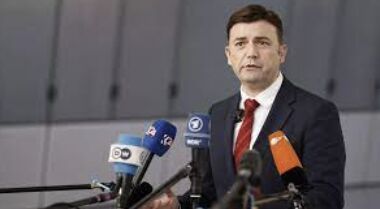Baltic and Ukraine Boycott OSCE Meeting, Citing Russia's Propaganda and Coercion
The foreign ministers of Estonia, Latvia, Lithuania, and Ukraine boycott an OSCE meeting due to the participation of Russia's foreign minister, Sergey Lavrov, citing propaganda concerns and Russia's abuse of consensus. Russia dismisses the boycott, emphasizing the need for security and cooperation. Lavrov's visit to North Macedonia marks a rare visit to a NATO member country since the invasion of Ukraine. The Baltic nations and Ukraine accuse Russia of obstructive behavior, while Russia insists on a return to the organization's original principles. The OSCE meeting in Skopje will address these tensions.
The foreign ministers of Estonia, Latvia, Lithuania, and Ukraine have announced their boycott of a meeting of the Organization for Security and Cooperation in Europe (OSCE) due to the participation of Russia's foreign minister, Sergey Lavrov. In a joint statement, the Baltic foreign ministers expressed their deep regret at Lavrov's attendance, stating that it would provide Russia with yet another opportunity for propaganda. Ukraine also expressed its objection to Lavrov's participation, accusing Russia of coercing and undermining the OSCE through the abuse of the rule of consensus.
The Russian delegation, on the other hand, believes that the boycott by the Baltic nations does not hold any significance for the future of the OSCE. Alexander Grushko, Russian Deputy Foreign Minister, stated that Russia will insist on the return of the OSCE to its original principles and purpose, emphasizing the need for security and cooperation. Lavrov's visit to North Macedonia for the OSCE meeting marks a rare visit to a NATO member country since Russia's invasion of Ukraine in February 2022. Lavrov has not visited any European country apart from Belarus since the conflict began.
In March 2022, Lavrov was also barred from flying to Geneva for a UN conference due to European Union sanctions. The Baltic foreign ministers accused Russia of obstructive behavior within the OSCE itself, highlighting Russia's prevention of an OSCE presence in Ukraine and the blocking of Estonia's chairmanship of the organization in 2024. They argued that Lavrov's attendance at the meeting in Skopje would risk legitimizing Russia as a rightful member of the community of free nations and trivializing the crimes committed by Russia in Ukraine.
The OSCE, consisting of 57 nations, was established during the Cold War to defuse tensions between East and West. North Macedonia, as the holder of the organization's rotating presidency, invited Lavrov to the two-day meeting. North Macedonia's Foreign Minister, Bujar Osmani, clarified that Lavrov's attendance should be viewed as his participation in the OSCE meeting rather than an official visit to Skopje.
Osmani emphasized that the Russian Federation has violated the commitments of OSCE principles and that North Macedonia has been using the OSCE platform for holding Russia accountable for its actions in Ukraine. In conclusion, the boycott by the Baltic nations and Ukraine highlights the ongoing tension between Russia and its neighboring countries within the OSCE. The Baltic foreign ministers and Ukraine accuse Russia of obstructive behavior and aggression, while Russia insists on a return to the original principles and purpose of the organization. The OSCE meeting in Skopje will serve as a platform for further discussions on these contentious issues.




